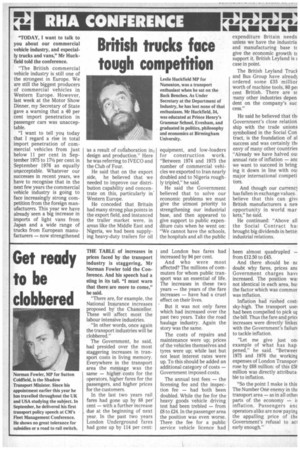Get ready to be clobbered
Page 26

If you've noticed an error in this article please click here to report it so we can fix it.
Norman Fowler, MP for Sutton Coldfield, is the Shadow Transport Minister. Since his appointment earlier this year he has travelled throughout the UK and USA studying the subject. In September, he delivered his first transport policy speech at CM's Fleet Management Conference. He shows no great tolerance for subsidies or a road to rail switch.
THE TABLE of increases in prices faced by the transport industry is staggering, Mr Norman Fowler told the Conference. And his speech had a sting in its tail. "I must warn that there are more to come," he said.
"There are, for example, the National Insurance increases proposed by the Chancellor. These will affect most the labour intensive industries.
"In other words, once again the transport industries will be clobbered."
The Government, he said, had presided over the most staggering increases in transport costs in living memory. Everywhere in the transport area the message was the same — higher costs for the operators, higher fares for the passengers, and higher prices for the customers.
In the last two years rail fares had gone up by 88 per' cent — with a further increase due at the beginning of next year. In the past two years London Underground fares had gone up by 114 per cent: and London bus fares had increased by 94 per cent.
And who were most affected? The millions of commuters for whom public transport was an essential of life. The increases in these two years — the years of the fare increases — have had a cruel effect on their lives.
But it was not only fares which had increased over the past two years. Take the road haulage industry. Again the story was the same.
The costs of repairs and maintenance were up; prices of the vehicles themselves and tyres were up; while last but not least interest rates were up. To this should be added an additional category of costs — Government imposed costs.
The annual test fees — the licensing fee and the inspection fee — had both been doubled. While the fee for the heavy goods vehicle driving test had been trebled — from E8 to £24. In the passenger area the position was even worse. There the fee for a public service vehicle licence had been almost quadrupled — from £12.50 to £45.
And there should be n( doubt why fares, prices anc Government charges have increased. The position ww not identical in each area, bui the factor which was commor was inflation.
Inflation had rushed cost sky-high. The transport usei had been compelled to pick 14 the bill. Thus the fare and price increases were directly linkec with the Government's failure to tackle inflation.
"Let me give just on example of what has hap pened," he said. "Betweer 1975 and 1976 the workirq expenses of London Transpori rose by £68 million: of this £5 million was directly attributa. ble to inflation.
"So the point I make is this The Number One enemy in thE transport area — as in all ot hei parts of the economy — inflation. Passengers anc operators alike are now paying the appalling price of thE Government's refusal to adi early enough."








































































































